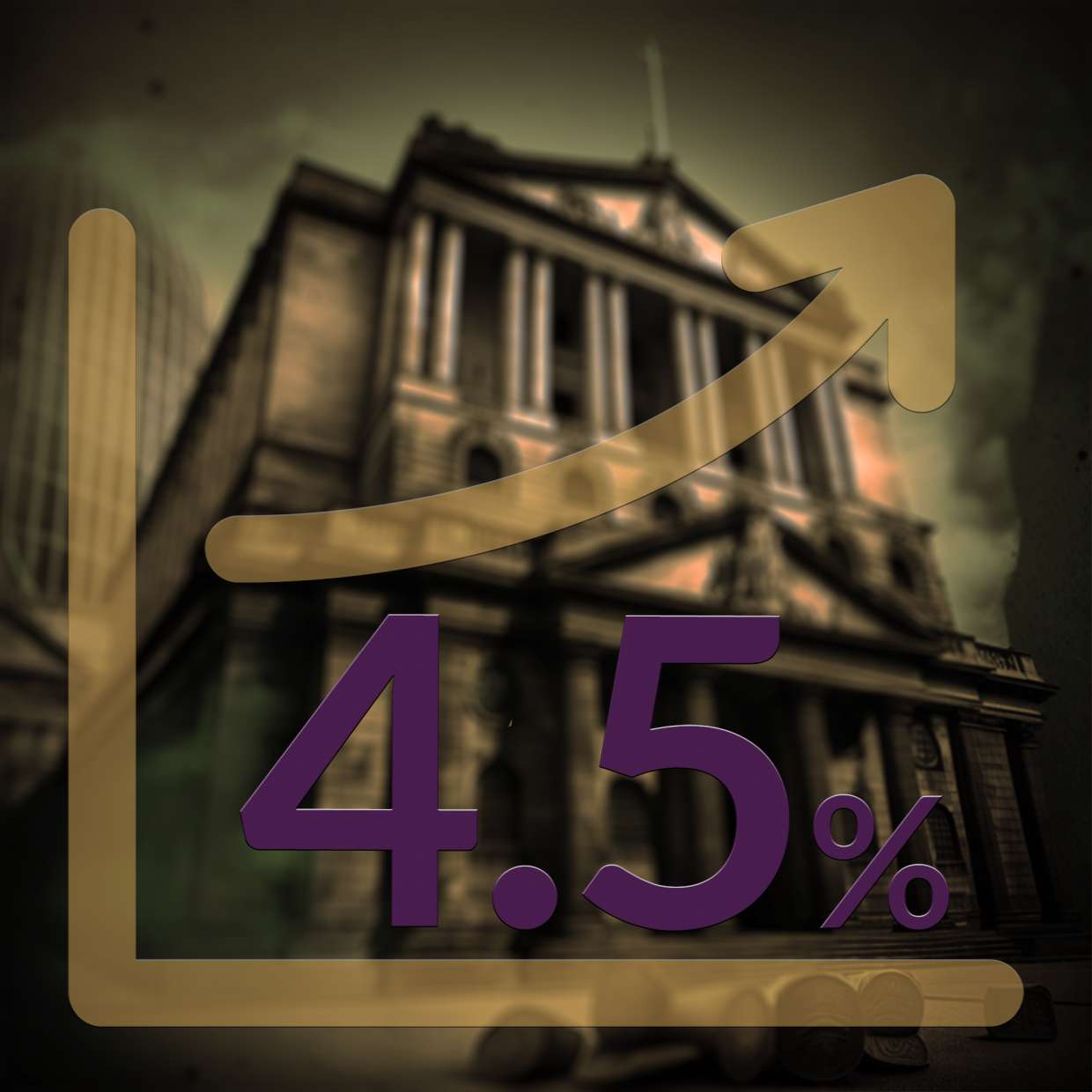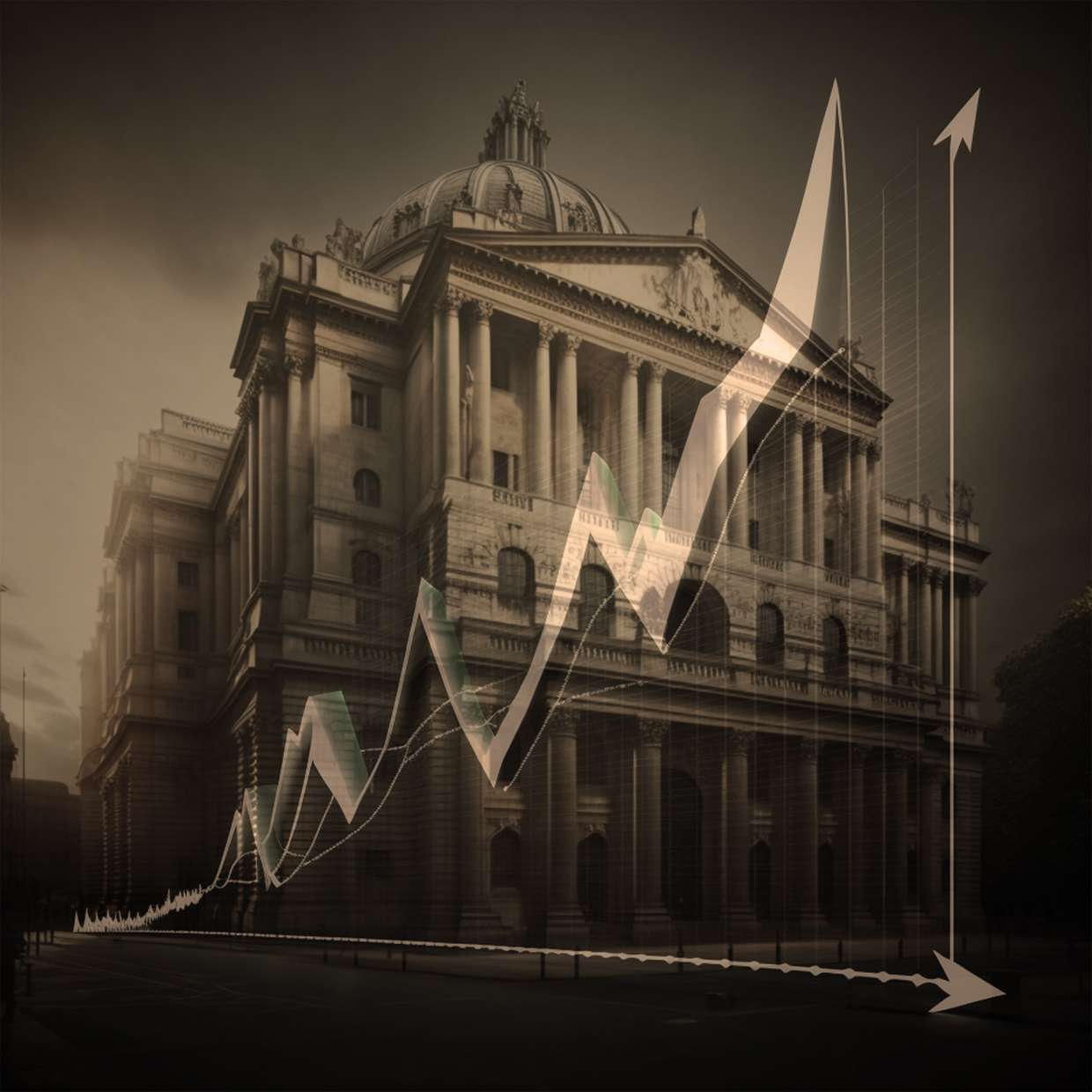Bank of England Raises Interest Rates by 0.25 Percentage Points to 4.5%
Synopsis
Bank of England unleashes the 12th consecutive interest rate surge, propelling rates to the highest levels since the 2008 global financial crisis. Savers rejoice as returns soar, while borrowers grapple with the burdensome impact of elevated mortgage payments. But amidst this financial storm, one burning question remains: When will the base rate hikes finally come to an end?

Key Takeaways
- Bank of England increased interest rates by 0.25 percentage points, reaching 4.5% for the 12th consecutive time.
- The Monetary Policy Committee voted with seven members in favor and two in dissent.
- The global financial crisis in 2008 significantly impacted interest rates, with rates remaining below 6% and falling to historic lows.
- Borrowers, particularly homeowners, will face increased mortgage payments, while borrowing costs will rise for those seeking loans.
- Savers can benefit from higher interest rates, offering enhanced returns on investments.
- The Bank of England predicts a gradual economic recovery and expects the economy to regain lost ground by the end of the year.
- Inflation remains a challenge, with rates expected to stay above 5% by year-end and between 3-4% by June 2024.
BoE Interest Rates Increased for 12th Consecutive Time
On 11th May, 2023, The Bank of England increased interest rates by 0.25 percentage points, elevating them to 4.5%. This move signifies the 12th consecutive augmentation of interest rates and propels them to their peak since the apex of the global financial crisis in October 2008, nearly 15 years ago. While the primary reason behind this strategic manoeuver is to curtail surging prices, its repercussions extend to wealthy households, astute borrowers, discerning savers, and the overall economic terrain.
| Date | Rate % | Percentage Point Change |
| 19-Mar-20 | 0.10% | - 0.15% |
| Dec-21 | 0.25% | + 0.15% |
| Feb-22 | 0.50% | + 0.15% |
| Mar-22 | 0.75% | + 0.25% |
| May-22 | 1% | + 0.25% |
| Jun-22 | 1.25% | + 0.25% |
| Aug-22 | 1.75% | + 0.50% |
| Sep-22 | 2.25% | + 0.50% |
| Dec-22 | 3.50% | + 1.25% |
| Feb-23 | 4% | + 0.50% |
| Mar-23 | 4.25% | + 0.25% |
| May-23 | 4.50% | + 0.25% |
Bank of England Base Rate Increases Since March 2020
The Bank of England's Monetary Policy Committee Vote
The Monetary Policy Committee (MPC) of the Bank of England sanctioned the interest rate surge, with seven out of nine members endorsing the measure. The majority cited recurrent astonishments regarding the resiliency of demand and the formidable sway of inflation as pivotal factors influencing their verdict. They emphasised that the prices of food and various commodities have eclipsed anticipatory thresholds. However, two members dissented, advocating for rate stability. They contended that inflation is already slated for a substantial descent this year and underscored the notion that the full impact of rate hikes has yet to permeate the economic landscape.
Will There Be Another Global Financial Crisis?
To comprehend the profound implications of the interest rate escalation, one must think on the tough financial period of the global financial crisis in October 2008. During that time, the disintegration of several financial institutions left an indelible imprint on the global economy. Consequently, interest rates underwent substantial reduction to invigorate growth and avert a deeper recession.
The global financial crisis of 2008 marked a significant turning point in the UK's interest rate history. Interest rates consistently remained under 6%, and the base rate fell to its lowest level in 300 years. It sat at 5.75% in July 2007, falling dramatically to just 0.5% by March 2009. The rate fell again in August 2016 to 0.25%, benefiting all homebuyers. The interest rate rose slightly back to 0.5% by November 2017, and again to 0.75% in August 2018.
Now, nearly 15 years later, the Bank of England finds itself augmenting rates to unprecedented levels, reminiscent of those tumultuous times.

Impact on Borrowers and Savers
One immediate consequence of the interest rate surge is the pressure it imposes on borrowers, especially homeowners. As rates ascend, mortgage payments soar, placing additional strain on households already grappling with the spiralling cost of living. Moreover, individuals in pursuit of loans will encounter elevated borrowing costs, potentially discouraging investment and dampening economic activity. However, it is vital to discern that higher interest rates can prove advantageous to discerning savers, as they are poised to anticipate enhanced returns on their investments.

What Is The Future Outlook of UK Interest Rates?
In conclusion, The Bank of England's decision to increase a 0.25 percentage point interest rate surge to 4.5% broadcasts an unequivocal message that wresting inflation under control constitutes an overriding priority. With the twelfth consecutive rate elevation, the central bank endeavours to stabilise prices and foster economic equilibrium. However, one cannot overlook the repercussions borne by discerning borrowers, particularly opulent homeowners grappling with augmented mortgage payments.
Additionally, intensified borrowing costs may exert a restraining influence on investment decisions and economic growth. On a positive note, astute savers stand to reap the rewards of augmented returns on their investments. Looking ahead, the Bank of England's optimistic economic outlook and prospects of a gradual recovery bring about a sense of optimism. The economy is poised to regain lost ground caused by the pandemic before the culmination of this year, surpassing initial future events and denoting a swifter rebound. However, the lingering persistence of inflation remains an demanding challenge, with rates expected to remain above 5% by year-end and hover between 3-4% by June 2024.
Related Articles
This guide and its content is copyright of Chard (1964) Ltd - © Chard (1964) Ltd 2025. All rights reserved. Any redistribution or reproduction of part or all of the contents in any form is prohibited.
We are not financial advisers and we would always recommend that you consult with one prior to making any investment decision.
You can read more about copyright or our advice disclaimer on these links.




















